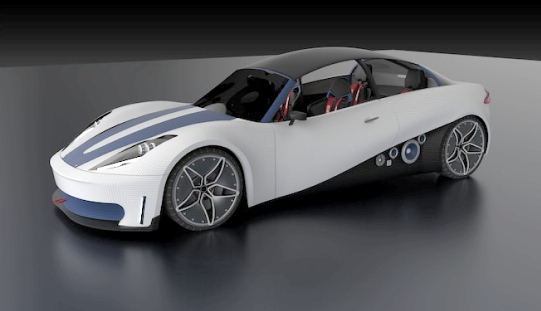Local Motors Unveils Designs for World’s First Production Line of 3D-Printed Cars
3D printing pioneer firm Local Motors has announced the winner of its Project Redacted challenge design competition which will serve as the inspiration for the world’s first fleet of 3D-printed cars. The winning design of Project Redacted is Reload Redacted – https://localmotors.com/Reload/reload-redacted-swim-and-sport/ Swim/Sport by Kevin Lo.
In addition to its revolutionary design, the entry showcases many benefits of Direct Digital Manufacturing (DDM), including the ability to create a completely customizable vehicle. What’s more, its design boasts a flexible foundation that can. Local Motors many different styles and technology options.
Local Motors also congratulated Jose Luis Varela, whose Outrunner design was chosen as second place winner, while Rovena Alexandru’s Code Name: Orion ( Ori) came in third.
The goal of this program is for us to begin to understanding the challenges of a transportation-on-demand system built around autonomous cars.
Local Motors is the first company to utilize DDM in vehicle production, with the goal of decreasing the amount of tooling while increasing speed to market for highway-ready vehicles. Local Motors proved the ability to build vehicles with DDM when it debuted the worlds first 3D-printed car, the Strati, in September of 2014.
“At Local Motors, we are hellbent on revolutionizing manufacturing,” says John B. Rogers, Jr., CEO and co-founder of Local Motors. “Car manufacturers have been stamping parts the same way for more than 100 years. We now have the technology to make the process and products better and faster by linking the online to the offline through DDM. This process will create better and safer products, and we are doing exactly that.”
Local Motors launched Project Redacted to challenge the co-creation community to imagine and design the next generation of 3D-printed cars. The winning entry will act as the foundation for the worlds first, and yet-to-be-named, road-ready 3D-printed vehicles. Local Motors plans to design, build and sell a Low Speed Electric Vehicle (LSEV) iteration, planned to debut in Q1 2016, as well as a fully homologated highway-ready version later that year.
The winning entry was chosen after a voting process that tapped the Local Motors community, as well as a professional judging panel, including former Tonight Show host and car enthusiast Jay Leno, SEMA Vice President of Vehicle Technology John Waraniak and SABIC Senior Manager Geert Jan Schellekens.
“You need something that makes you go ‘whats that?’,” Leno said of the winning entry. “My top choice would be Reload Redacted – Swim/Sport because its sporty, fun and you can commute in it.”
Top U.S. universities and national laboratories continue partnering with Local Motors
Local Motors today also unveils a fleet of vehicles it has coined LOCO University Vehicles. LOCO, short for Local Motors Co-Created University Vehicles, is one of the first steps in the company’s effort to change the automotive industry forever by partnering with some of the nations top universities and laboratories. The university partnerships will amplify 3D-printing and other technologies by co-creating with some of the best and brightest minds in the nation.
The first three universities to participate in the program are the University of Michigan (U of M), Arizona State University (ASU) and the University of Nevada at Las Vegas (UNLV).
U of M has taken delivery of a LOCO, with its research efforts focusing on the development of autonomous (self-driving) technology. U of M plans to use the LOCO to develop a fleet of autonomous vehicles which will transport students around the University’s North Campus, while also serving as the nations first testbed for on-demand autonomous.
“Think Uber,” but with low-speed, autonomous cars,” said Ed Olson, an associate professor of Electrical Engineering and Computer Science at University of Michigan who leads the project. “The goal of this program is for us to begin to understanding the challenges of a transportation-on-demand system built around autonomous cars.”
The UNLV LOCO will also focus on autonomous vehicle technology. The partnership with Arizona State University will conduct and gather groundbreaking research on advanced materials. The goal with all the schools is to deliver the latest technology in additive manufacturing to the Local Motors community, who will be hard at work in the coming months co-creating on and bringing Reload Redacted to roads across America.
Cutting-Edge Technology Will Define All Aspects Of The 3D-Printed Car
DDM allows for the rapid adoption of new technology in vehicles. For example, the Local Motors co-creation community has built an electric powertrain test platform to explore advanced battery technology that will go into the 3D-printed car.
The battery technology in the test platform uses the same lithium ion chemistry used in existing electric vehicles (as well as iPhones). Local Motors is already working to identify numerous cutting-edge battery options. For example, the company is exploring lithium sulfur battery technology, which creates three times the energy at half the weight of lithium ion technology.
The electric powertrain test platform also serves as a base for the development of the powertrain that will be used in the 3D-printed vehicle. Local Motors says it is poised to leapfrog current EV technology within the next 12-18 months.
For more information, visit: http://facebook.com/localmotors follow on Twitter @localmotors, andiscover more at http://localmotors.com.
Source: Local Motors


